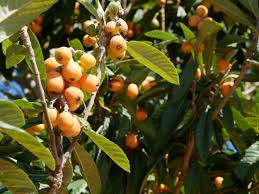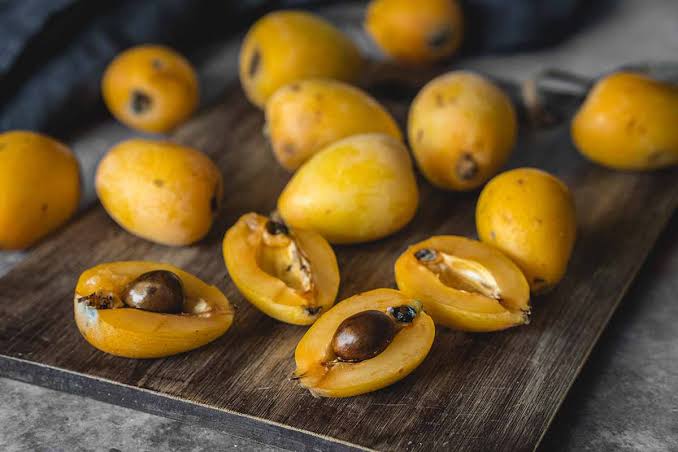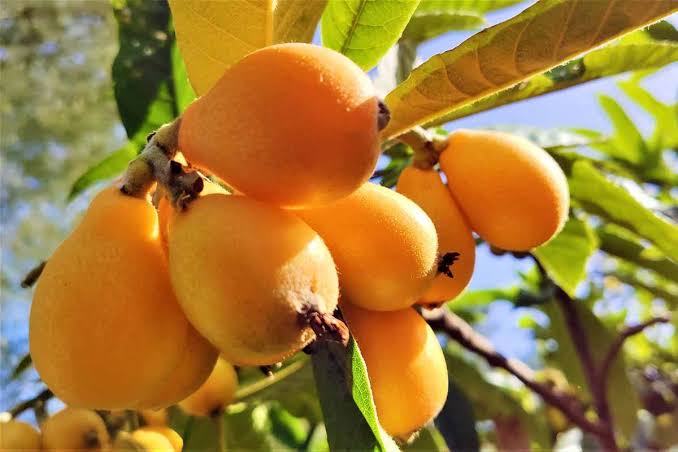Loquats, scientifically known as Eriobotrya japonica, are delightful fruits that originate from southeastern China. These small, orange-colored fruits belong to the Rosaceae family and are cherished for their sweet and slightly tangy taste. Loquats are often enjoyed fresh, but they can also be used in various culinary delights.
The loquat tree, evergreen in nature, graces gardens with its glossy, dark green leaves. In spring, the tree bursts into clusters of fragrant, white flowers, hinting at the impending fruitfulness. The fruit, resembling apricots, matures in late spring to early summer, enticing both human and avian admirers.
One remarkable aspect of loquats is their versatility in culinary applications. From snacking on the juicy fruit to incorporating it into jams, jellies, and desserts, loquats add a unique flavor profile to various dishes. Due to their natural sweetness, they serve as a delightful addition to salads and fruit bowls.
Apart from their palatable qualities, loquats also boast health benefits. Rich in vitamins A and C, as well as dietary fiber, they contribute to overall well-being. The antioxidants present in loquats are believed to support immune function and may have anti-inflammatory properties.
Cultivation of loquats is not confined to their native China; they have found homes in diverse regions with favorable climates. The trees thrive in subtropical and mild temperate climates, making them adaptable to different environments. Cultivators appreciate the resilience of loquat trees, which can withstand occasional frost and even periods of drought.
In addition to their culinary and nutritional value, loquats hold cultural significance in some regions. They are symbolic of good fortune and prosperity in Chinese culture, often associated with the Lunar New Year celebrations.
The loquat, scientifically designated as Eriobotrya japonica, is a captivating fruit celebrated for its sweetness, versatility, and health benefits. From the vibrant blossoms of the loquat tree to the succulent fruits that follow, this delightful member of the Rosaceae family continues to leave an enduring impression on those who savor its unique charm.
Read Also: Importance of Rabbit Urine and How to Use it
The History of Loquats Fruits

The history of loquats traces back to southeastern China, where the fruit has been cultivated for centuries. The scientific name, Eriobotrya japonica, highlights its Japanese origins, even though its cultivation primarily began in China.
Loquats have deep cultural roots in China, where they are associated with good fortune and prosperity. The fruit has been a part of Chinese traditions, symbolizing auspicious beginnings and a bountiful harvest. Over time, the cultivation of loquats spread beyond China, reaching other parts of Asia and eventually making its way to various corners of the globe.
As explorers and traders navigated the seas, loquats found new homes in different regions with suitable climates. Their adaptability allowed them to take root in diverse environments, from subtropical zones to mild temperate climates. The spread of loquats is a testament to their resilience and the appreciation for their delectable taste.
In addition to being valued for their flavor, loquats gained attention for their potential health benefits. The vitamins and antioxidants found in the fruit contributed to its reputation as a nutritious addition to diets.
In more recent times, as global travel and communication flourished, loquats became not only a local delicacy but also a fruit recognized and enjoyed internationally. Cultivators and enthusiasts appreciate the beauty of the loquat tree, from its lush, dark green foliage to the fragrant blossoms that herald the arrival of the sweet, apricot-like fruits.
The history of loquats is a tale of cultural significance, culinary delight, and adaptability that transcends geographical boundaries. From its humble origins in China to becoming a cherished fruit in various parts of the world, the journey of the loquat reflects the interconnectedness of cultures through the shared enjoyment of nature’s bounty.
The Nutritional Values of Loquats Fruits

Loquats, scientifically known as Eriobotrya japonica, offer a range of nutritional benefits. These small, orange fruits are not only delightful to the palate but also contribute to overall well-being.
Loquats are a good source of essential vitamins, particularly vitamin A and vitamin C. Vitamin A plays a crucial role in maintaining healthy skin and promoting good vision, while vitamin C is known for its immune-boosting properties. The combination of these vitamins in loquats supports overall immune function and contributes to skin health.
In addition to vitamins, loquats provide dietary fiber. Fiber is essential for digestive health, promoting regular bowel movements and helping to prevent constipation. Including loquats in your diet can contribute to a well-rounded intake of fiber, supporting a healthy digestive system.
Furthermore, loquats contain antioxidants, which are compounds that help neutralize harmful free radicals in the body. Antioxidants play a role in reducing oxidative stress and inflammation, potentially contributing to overall health and well-being.
While loquats offer these nutritional benefits, it’s important to enjoy them as part of a balanced diet. Whether eaten fresh, added to salads, or used in culinary creations like jams and desserts, loquats can be a flavorful and nutritious addition to your overall dietary choices.
Read Also: What to Feed Rabbits
Health Benefits of Loquats Fruits

Loquats, scientifically known as Eriobotrya japonica, come with various health benefits, making them a nutritious addition to your diet.
1. Rich in Antioxidants: Loquats contain antioxidants, such as polyphenols, which help combat oxidative stress in the body. These antioxidants play a role in reducing inflammation and may contribute to overall health.
2. Boosts Immune Function: The presence of vitamin C in loquats is beneficial for the immune system. Vitamin C is known to support the production of white blood cells, helping the body defend against infections and illnesses.
3. Promotes Digestive Health: Loquats are a good source of dietary fiber, aiding in digestion and promoting regular bowel movements. Including fiber in your diet supports a healthy digestive system and can help prevent constipation.
4. Contributes to Skin Health: The presence of vitamin A in loquats is essential for maintaining healthy skin. Vitamin A supports skin cell regeneration and can contribute to a radiant complexion.
5. May Have Anti-Inflammatory Properties: The antioxidants in loquats may have anti-inflammatory effects, potentially benefiting conditions associated with inflammation in the body.
6. Nutrient Diversity: In addition to vitamins A and C, loquats provide minerals like potassium and manganese, contributing to the overall nutritional profile and supporting various bodily functions.
7. Low in Calories: For those mindful of their calorie intake, loquats can be a satisfying, low-calorie snack option compared to many processed snacks.
It’s essential to incorporate loquats into a balanced and varied diet to maximize their health benefits. While they offer valuable nutrients, moderation and diversity in food choices remain key for overall well-being.
How to Grow Loquats Fruits (Growing Guide)
Growing loquats, scientifically known as Eriobotrya japonica, can be a rewarding endeavor. Here’s a simple guide to help you cultivate these delightful fruits:
1. Climate: Loquats thrive in subtropical to mild temperate climates. They prefer well-drained soil and can tolerate occasional frost. Ensure your location provides enough sunlight, as loquat trees generally flourish in full sun.
2. Planting: Choose a sunny location with well-draining soil. Loquats can adapt to different soil types but prefer slightly acidic to neutral soil. Plant loquat trees in the spring, allowing them time to establish before winter. Dig a hole twice as wide as the root ball and at the same depth. Place the tree in the hole, fill it with soil, and water thoroughly.
3. Watering: Keep the soil consistently moist, especially during the first year of growth.
Once established, loquats are moderately drought-tolerant, but regular watering is still beneficial during dry periods.
4. Fertilizing: Fertilize loquat trees in the spring with a balanced fertilizer. Avoid excessive nitrogen, as it can lead to vigorous vegetative growth at the expense of fruit production.
5. Pruning: Prune young trees to encourage a strong structure. Remove any competing or crossing branches. As the tree matures, prune to shape and remove dead or damaged branches. Thin out excess fruit if the tree produces more than it can support.
6. Harvesting: Loquats typically ripen in late spring to early summer. Harvest the fruit when it has a vibrant orange color and yields slightly to gentle pressure. Twist or cut the fruit from the tree, taking care not to damage surrounding branches.
7. Pest and Disease Management: Keep an eye out for pests like aphids and scale insects. Insecticidal soap or neem oil can help control infestations. Ensure good air circulation around the tree to prevent fungal diseases.
Cultivating loquats requires attention to climate, soil, and basic care practices. With proper maintenance, your loquat tree can provide you with delicious and nutritious fruits for years to come.
Read Also: 20 Top Exercises To Improve Flexibility
